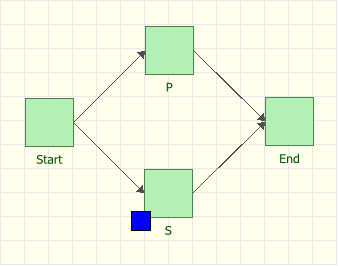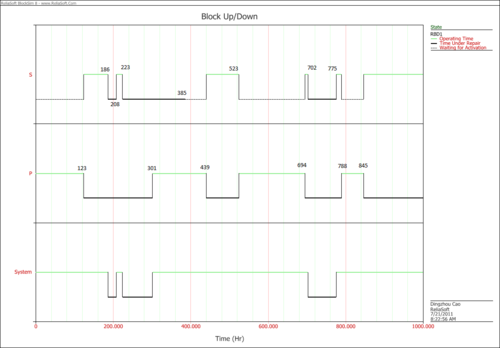BlockSim Example: Default ON unless SCT Overridden: Difference between revisions
Jump to navigation
Jump to search
Dingzhou Cao (talk | contribs) |
Dingzhou Cao (talk | contribs) |
||
| Line 20: | Line 20: | ||
Block P is the primary device. It belongs to maintenance group P. | Block P is the primary device. It belongs to maintenance group P. | ||
Block S is the standby device. It has state change triggers. The initial state is OFF. If Block P goes down, then activate this block; if Block P is restored, then deactivate this block. | Block S is the standby device. It has state change triggers. The initial state is OFF. If Block P goes down, then activate this block; if Block P is restored, then deactivate this block. The State Upon Repair is “Default ON unless SCT Overridden”. | ||
Both Block P and S have Weibull distribution with Beta=1.5 and Eta=100 for reliability and repair action. <br> | Both Block P and S have Weibull distribution with Beta=1.5 and Eta=100 for reliability and repair action. <br> | ||
Revision as of 17:31, 12 October 2011
Default ON unless SCT overridden Example
Purposes
The purposes of this example are to illustrate the following options in SCT:
- State Upon Repair: Default ON unless SCT overridden
- Activate a block if any item from these associated maintenance group(s) goes down
- Deactivate a block if any item from these associated maintenance group(s) is restored
Description
Consider a system shown in Figure below:
Block P is the primary device. It belongs to maintenance group P.
Block S is the standby device. It has state change triggers. The initial state is OFF. If Block P goes down, then activate this block; if Block P is restored, then deactivate this block. The State Upon Repair is “Default ON unless SCT Overridden”.
Both Block P and S have Weibull distribution with Beta=1.5 and Eta=100 for reliability and repair action.
Both Block P and S are as good as new after repair.
Block Up/Down plot
The Blocksim modeling of this system is shown in Figure below.
- At 123, Block P fails and activates Block S.
- Block S fails at 186 and is restored at 208. According to setting, it is ON upon repair.
- At 223, Block S fails again.
- At 301, Block P is restored, and put a request to deactivate Block S. However, Block S is down for repair at this point. The request overwrites the default setting "state upon repair" of Block S. Thus when Block S is done with repair at 385, it is OFF.
- At 439, Block P fails and activates Block S.
- At 523, Block P is restored and deactivates Block S.
- At 694, Block P fails and activates Block S.
- At 702, Block S fails and it is get repair at 775. According to setting, it is ON upon repair.
- At 788, Block P fails and activates Block S.
- At 845, Block P is restored and deactivates Block S.

